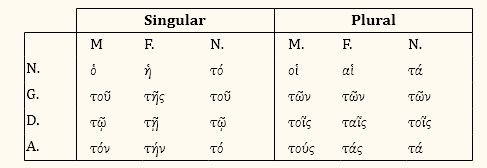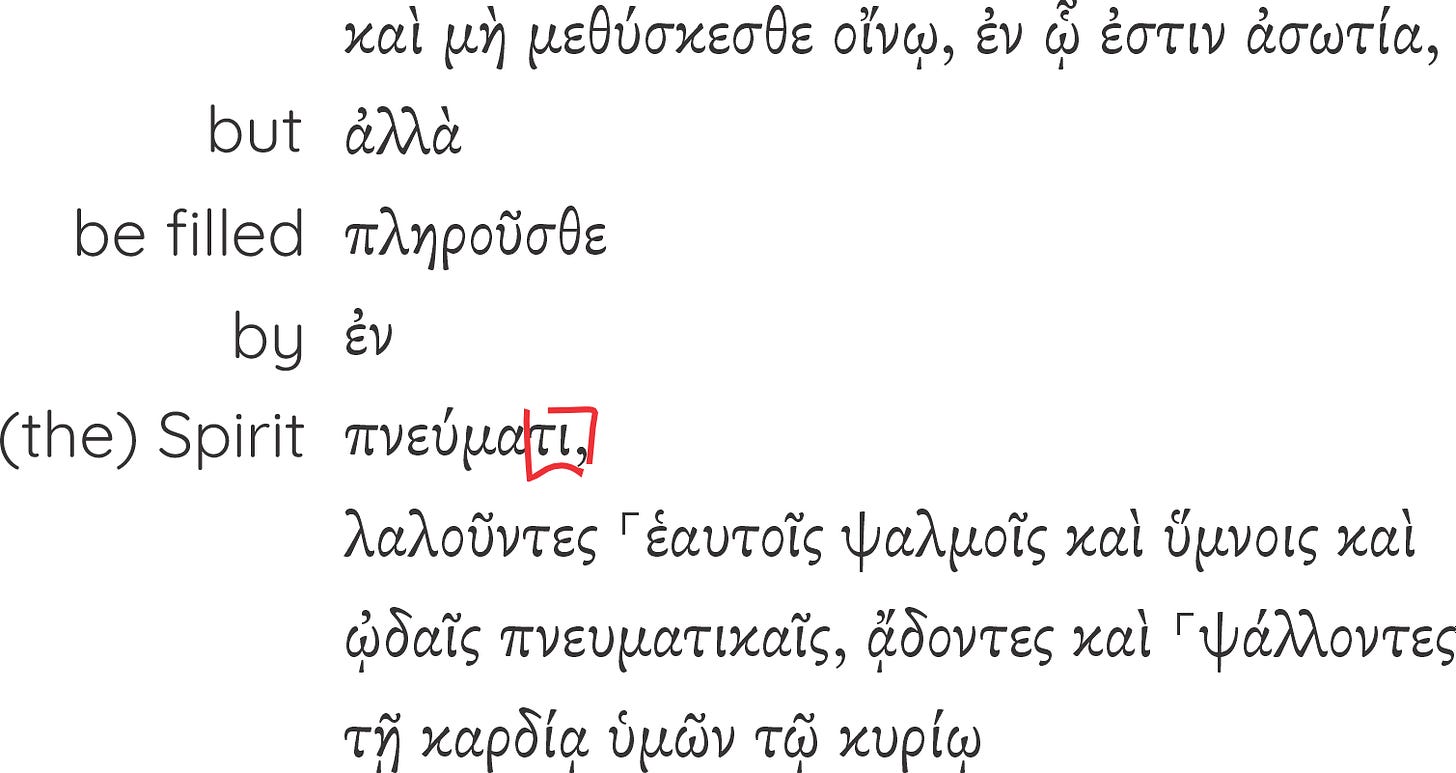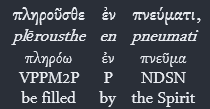And do not get drunk with wine, for that is debauchery, but be filled with the Spirit, addressing one another in psalms and hymns and spiritual songs, singing and making melody to the Lord with your heart Ephesians 5:18–19
Paraphrasing from many sermons touching on this passage:
There are two acts of the Spirit—indwelling and filling. In one, the Spirit is in you, while in the other, the Spirit comes upon you. You are indwelled when you first have faith, but the filling of the Spirit is continual. You should pray—right now!—that the Spirit comes upon you and fills you with kingdom power!
At least some (famous and well-regarded) commentaries agree:
The Scriptures bear a decisive testimony that the filling of the Holy Spirit is a repeated experience. … The evidence for the experimental nature of the filling of the Holy Spirit is fully sustained in every instance.[1]
Is this what the Scriptures say? Before diving into Greek to discover what we might find, let's consider the grammatical problem this sentence poses using English examples.
Suppose you walk into a campground where a fire crackles and sparks in a pit, carrying a bucket of water. Someone says, "Put that bucket on the fire." Do you:
Pour the water out over the fire, extinguishing it? Are you treating the water as the object of your action and the bucket as the means?
Set the bucket on top of the fire to heat the water? Are you treating the bucket as the object of your action?
You cannot tell what our speaker is saying in English without more context. Is it close to time to retire for the night, so the fire needs to be put out? Is it just after dinner and time to wash the dishes? Is it just about time to bath, so someone needs hot water?
Much is often made of the difference between "in" and "on" (or "upon") in this passage compared to others, so let's rephrase the sentence: "Put that bucket in the fire." Does the meaning change? No, we still need the context to tell us the speaker's intended meaning.
"In" and "on" are prepositions. They tell us something about where the action should take place. They tell us nothing about how the action should be taken—whether the bucket is the object or the means of the action.
The Case of the Noun
What if we could put something at the end of the word "bucket" to indicate that the bucket is the object of the verb or the means by which the verb should be accomplished? For instance, if we add "-ez" to mean "this is the object of the verb" and "-er" to mean "this is the means by which the action should be taken," we might have something like:
Put the bucket-ez on the fire would mean: Place the bucket itself on the fire so the water inside becomes hot.
Put the bucket-er on the fire would mean: Use the bucket as a means to pour water on the fire.
Surprise, surprise, surprise! Greek has just such a way of indicating the case (or declination) of a noun.
The four letters on the left side of the chart mean:
Nominative, the verb's subject
Genitive, possession, or relationship
Dative, the verb's indirect object
Accusative, the verb's direct object.
The endings in the chart change based on other declension rules, so don't get too hung up on the chart—just remember we can tell a noun's case by declining the noun.
Let's take a peek at Ephesians 5:18-19 in the Greek to see what we find.
Four Greek words of interest have been called out here: "but be filled by (the) Spirit." We need to know the case of Spirit. Fortunately, you do not need to be a Greek scholar to answer this question. Logos (and many other applications) will give you the case of each word.
Under πνεύματι we see:
N, this is a noun
D, this is in the dative case
S, this is singular
N, this is neuter
Spirit is in the dative case—it is the indirect rather than the direct object of the verb. While a bit wordier, then, we could translate this something like:
… but be filled by (the means of) the Spirit …
We are not to be filled by the Spirit, but rather someone—presumably God—uses the Spirit to fill us with something. What is that something? Maybe the following passage will be helpful.
… addressing one another in psalms and hymns and spiritual songs, singing and making melody to the Lord with your heart, giving thanks always and for everything to God the Father in the name of our Lord Jesus Christ, submitting to one another out of reverence for Christ. Ephesians 5:19–21
Other Ways to Think About Filling
What do we usually take "I was overcome with anger" to mean? It does not mean "some external being poured anger into my soul!" They mean something like: "I became so angry that anger, itself, ended up overriding my better judgment, and I did some dumb things."
In the same way, when Paul says, "Be filled with the Spirit," he is saying, "Allow the good things of the Spirit to overcome you, teaching you to praise God."
How should we think about the indwelling of the Spirit? Should we think that God gives us some measure of the Spirit (say, 50%) when we first place our faith in Christ, and the other 50% is poured out over us in some situations (when we pray for "kingdom power")?
It doesn't seem like this works. Being 50% indwelled by the Spirit seems like being 50% pregnant, 50% married, or some other nonsensical idea. Either the Spirit indwells you, or it does not. It does not make much sense to hold there are "intermediate states" of indwelling.
The Bottom Line
There is no "second filling" or "second action" on the part of the Spirit here, but rather a description of how God uses the Spirit as a means to give us joy and spiritual maturity.
We are to be filled by the means of the Spirit with psalms, hymns, spiritual songs, and giving thanks. God fills us using (by the means of) the Spirit to live a more fully Christian life.
[1] John F. Walvoord, The Holy Spirit (Galaxie Software, 2008), 195.






